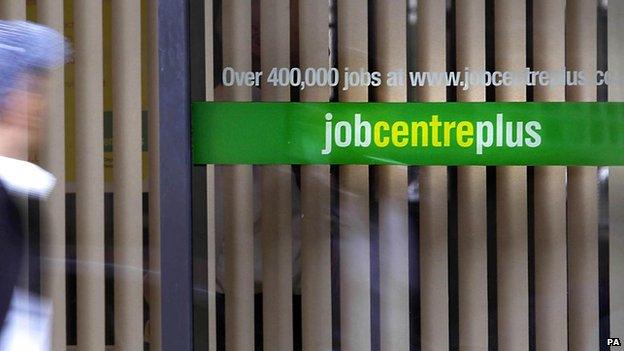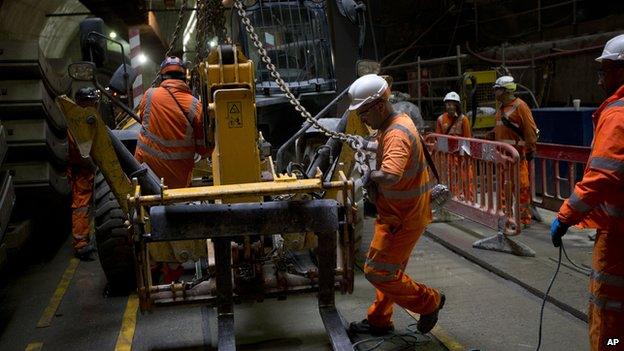UK unemployment falls to seven-year low
- Published

Unemployment in the UK has continued to fall and the number of people in work has continued to rise, according to the latest official figures.
The number of people out of work, external in the January to March period fell to 1.83 million, down 35,000 from the previous quarter and the lowest for seven years.
At the same time, the total number in work rose to 31.1 million.
Average pay for employees, excluding bonuses, rose by 2.2% in the quarter compared with a year earlier.
Including the effect of bonus payments, average pay rose by 1.9% over the same period.
The figures mean that regular pay is now growing at its fastest rate for nearly four years.
It is also the seventh month in a row that the rate of regular pay increases has outstripped the prevailing annual rate of inflation, as measured by the consumer prices index.
But not all Wednesday's economic news was good. The Bank of England cut its 2015 growth forecast from 2.9% to 2.5%, and for next year from 2.9% to 2.6%, as governor Mark Carney unveiled his quarterly inflation report.

Record employment
The Office for National Statistics (ONS) said a further 202,000 people were in work in the January to March period, boosting the overall level of employment in the UK.

Huge public sector projects such as Crossrail in London have helped to boost employment
It said this meant the employment rate was now at 73.5%, its highest since records began in 1971.
On the other side of the coin, the unemployment rate fell to 5.5% in the January to March period, the lowest rate since the middle of 2008.
That was down from 5.7% in the October to December quarter and lower than the 6.8% level recorded a year ago.
The number of people claiming Jobseeker's Allowance, the old claimant count, fell by 12,600 in April to 764,000.
'Job-creating machine'
Employment Minister Priti Patel: "We're creating the right conditions for businesses to expand and grow to employ people again"
The new Conservative Work and Pensions Minister, Priti Patel, said she was pleased by the figures.
"This is a testament to our long-term economic plan, the work the government has been doing with our focus on job creation, creating the right economic conditions for businesses to expand and grow so they can employ people again, so this is very welcome news today," she said.
John Hawksworth, chief economist at PwC, said the British economy had become "an incredible job-creating machine".
"There are also more convincing signs than ever before that this extra demand for labour is causing the market to tighten, pushing up regular pay growth to 2.2%," he said.
"With consumer price inflation stuck at zero, workers are experiencing solid real pay rises for the first time since the recession," he added.
The Institute of Directors (IoD) said it expected real wages to keep on rising.
"Now that the economy is growing, employees are naturally looking for real terms increases in their salaries," said IoD spokesman James Sproule.
"IoD members tell us that they are able to increase wages because of improved corporate performance, meaning these wage increases are sustainable."
But the TUC's general secretary Frances O'Grady took a more downbeat view.
"Underemployment has barely recovered, leaving many families with fewer hours of work than they need," she said.
"And young people are hardly sharing in the recovery, with youth unemployment still far higher than before the crisis."